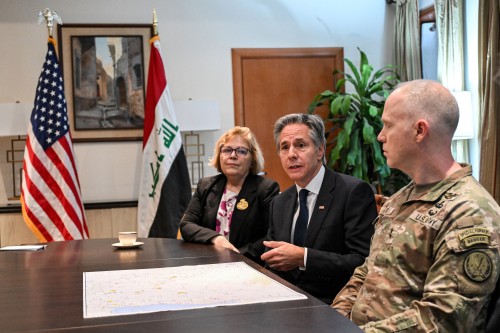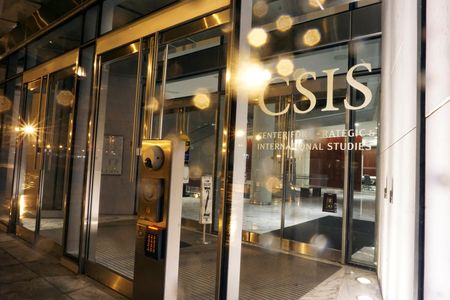By Simon Lewis
BAGHDAD (Reuters) -U.S. Secretary of State Antony Blinken made an unannounced visit to Iraq on Friday and met with Prime Minister Mohammed Shia al-Sudani to discuss Syria’s political transition, calling for a non-sectarian administration following the fall of Bashar al-Assad.
The top U.S. diplomat is touring the Middle East to establish a united front with Arab and Turkish allies on the set of principles that Washington hopes will guide Syria’s political transition, such as inclusivity and respect for minorities.
Washington was taken aback by the shockingly speedy collapse of the Assad government after 13 years of civil war and the outgoing administration of President Joe Biden is urging the victorious rebels to create a government that eschews Islamist factions.
Blinken visited the U.S. embassy in Baghdad and said he spoke to Sudani about the situation in Syria.
“As Syria transitions from the Assad dictatorship to hopefully a democracy, it does so in a way that, of course, protects all of the minorities in Syria that produces an inclusive, nonsectarian government and does not become, in any way, a platform for terrorism,” Blinken said at the U.S. embassy in Baghdad.
“No one knows the importance of that more than Iraq, because of the ongoing presence of ISIS or Daesh in Syria, and we are determined to make sure that Daesh cannot reemerge,” he said, referring to the Islamic State group.
The Biden administration, along with governments in the region and the West has been trying to navigate the chaotic aftermath of Assad family’s decades-long oppressive rule, and has begun engaging with the Syrian rebel groups including leading rebel faction Hayat Tahrir al-Sham (HTS).
HTS is a group formerly allied with al Qaeda and which is designated a terrorist organization by the U.S., the European Union, Turkey and the United Nations.
Following Iraq, Blinken heads back to Jordan, where he will attend a meeting of Arab and Turkish foreign ministers to discuss Syria.
COUNTERING IRAN
Iraq, which is led by a coalition of mostly Shi’ite political parties and armed groups close to Iran, is a major player in Tehran’s so-called Axis of Resistance that includes Hamas in Gaza and Lebanese Hezbollah and has faced setbacks since Israel responded to Hamas’ Oct. 7, 2023 attacks.
A U.S. official told Reuters that Washington sees this moment as an opportunity to further push back Iran’s influence in the region.
“I reaffirmed…our commitment to working with Iraq on security and always working for Iraq’s sovereignty to make sure that that is strengthened and preserved,” Blinken said.
Iraq opted not to allow Shi’ite militias to intervene in Syria as Sunni rebels advanced and ultimately seized Damascus last weekend, despite Baghdad’s concerns that unrest could spill over.
Thousands of Sunni fighters crossed from Syria into Iraq after the 2003 U.S. invasion and fueled years of sectarian killing before returning in 2013 as Islamic State to conquer a third of the country.
Opposition factions in Syria led by HTS have disavowed al Qaeda and Islamic State and say they have no ambitions in Iraq.
As the rebels in Syria advanced, Iraq had amassed on its border thousands of fighters from its conventional military as well as the Popular Mobilization Forces, a security agency containing many Iran-aligned armed groups that previously fought in Syria.
(Reporting by Simon Lewis; additional reporting by Humeyra Pamuk in Washington and Timour Azhari in Damascus; Editing by Ros Russell)








